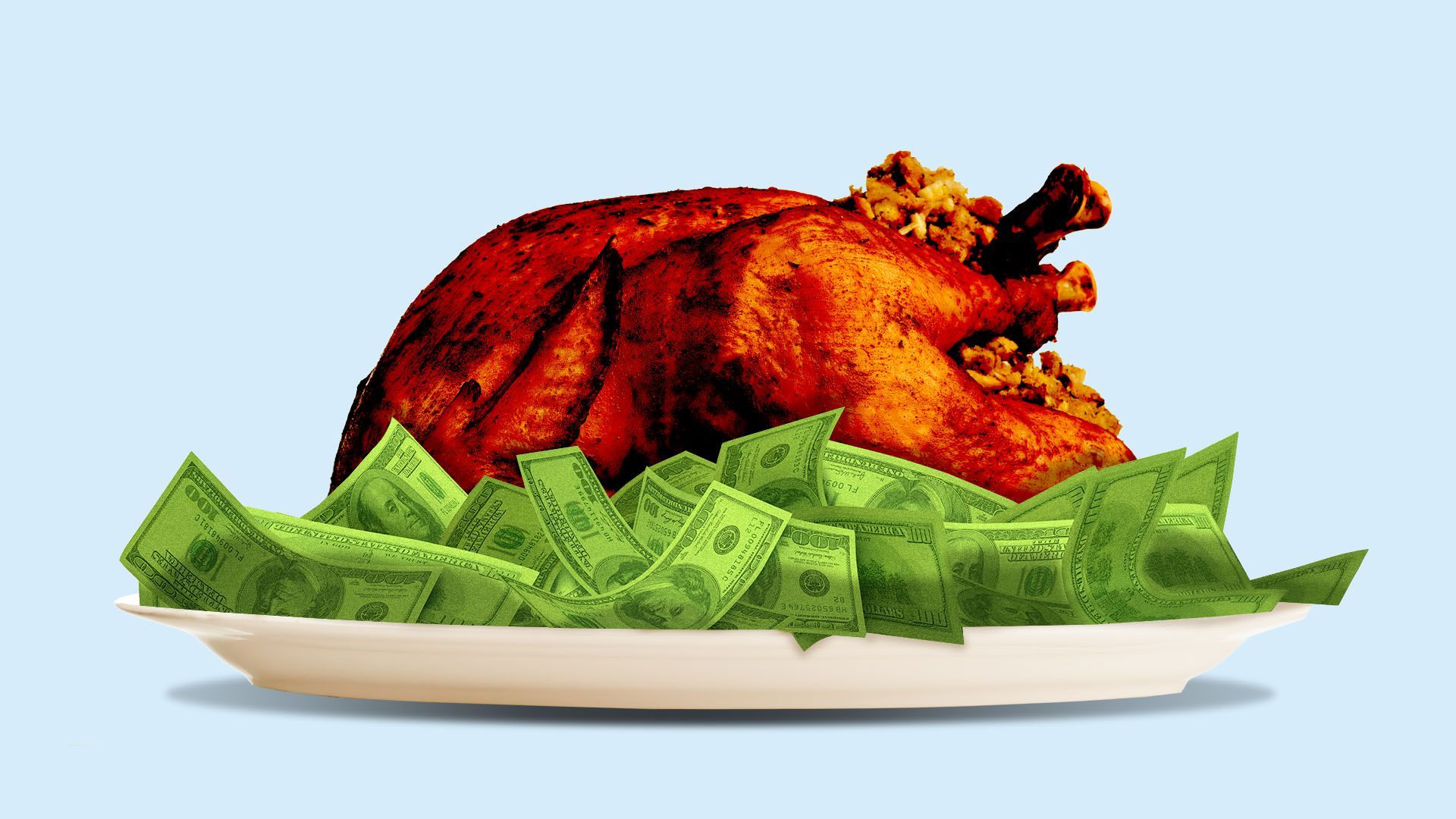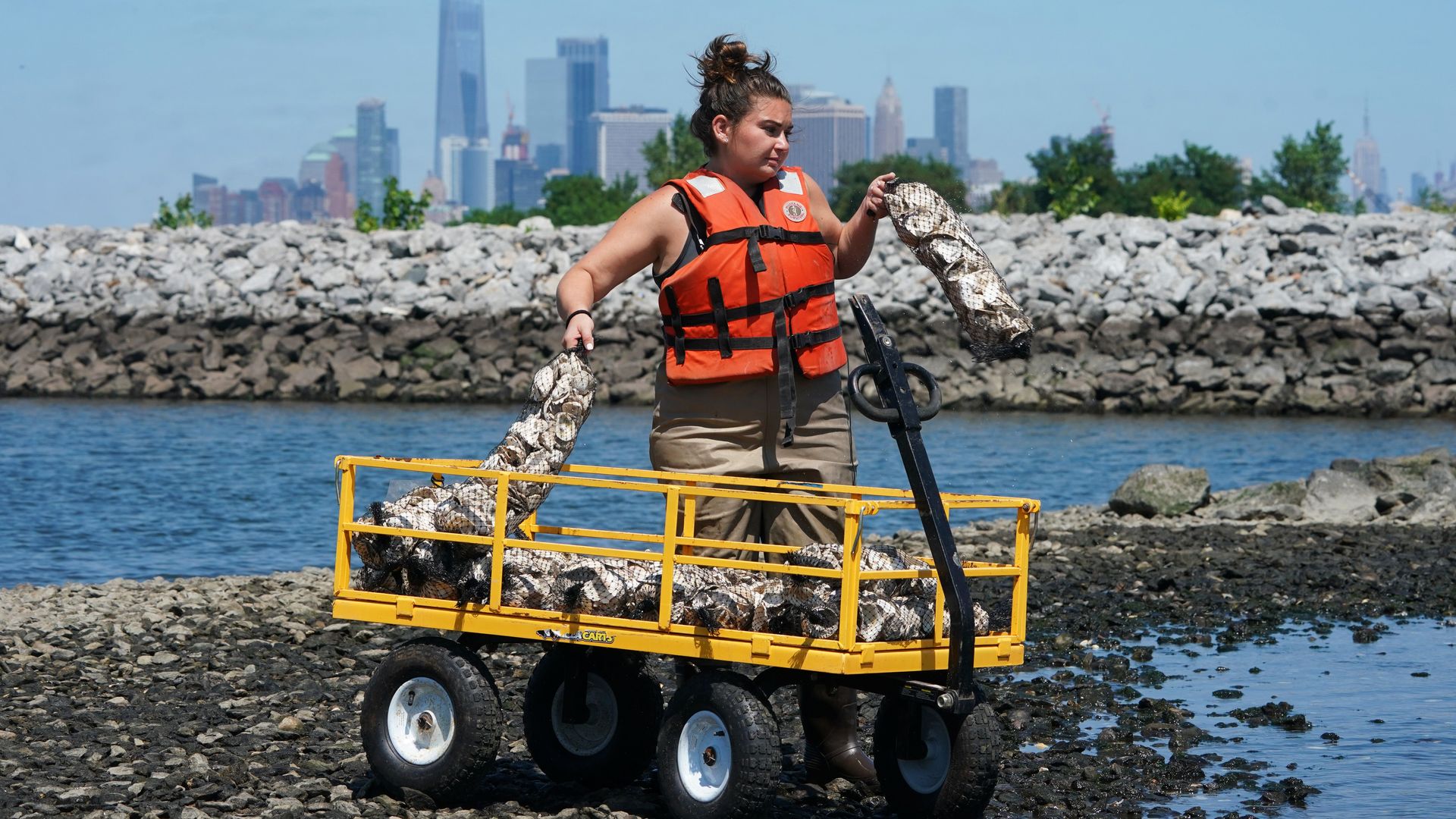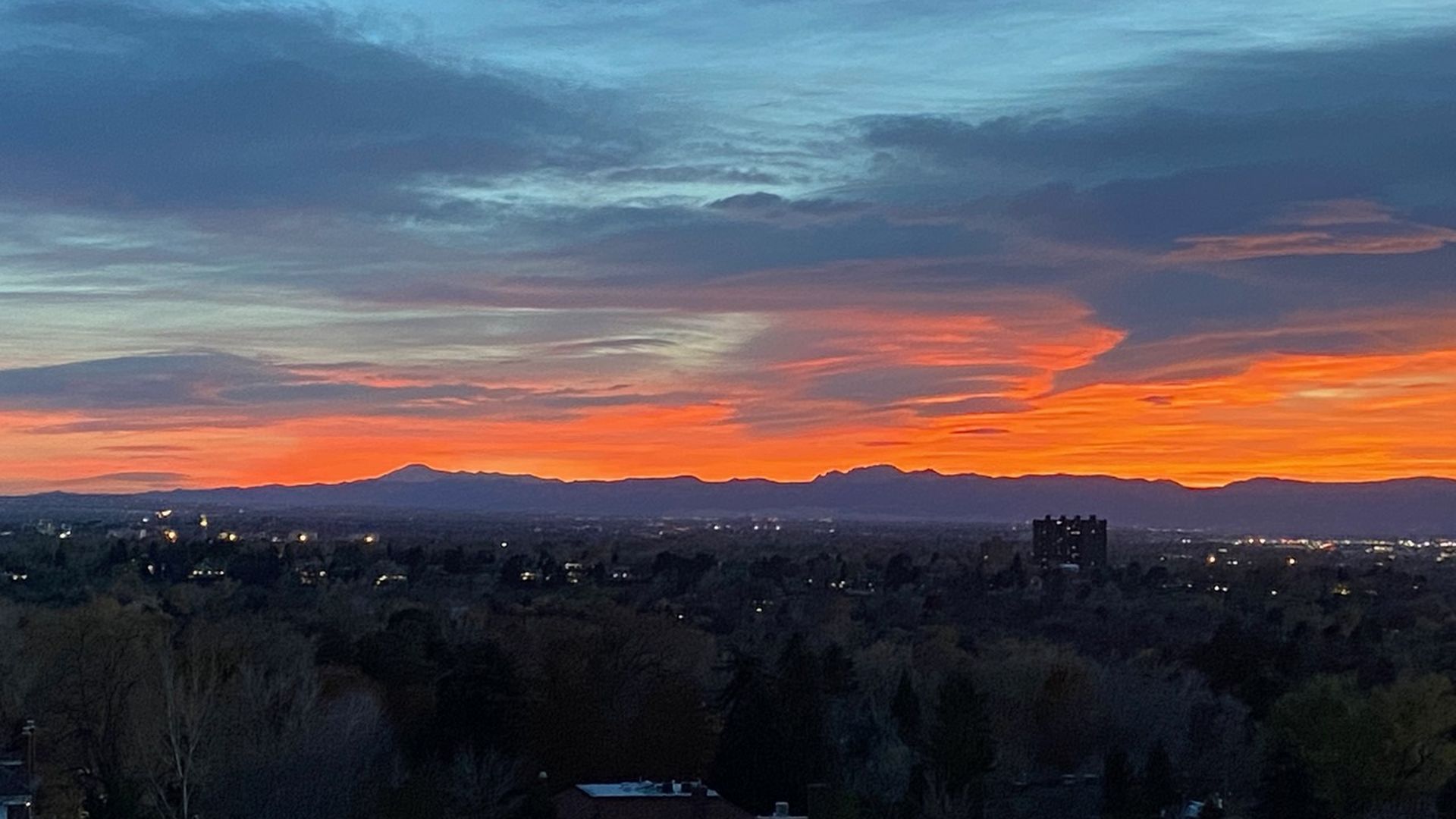| | | | | | | Presented By Axios HQ | | | | Axios What's Next | | By Jennifer A. Kingson, Joann Muller and Erica Pandey ·Nov 22, 2021 | | It's a short workweek — phew — and we'll be taking a "What's Next" pause on Thursday and Friday, when you'll have to find something else to do with the beguiling minutes you normally spend reading our newsletter. - Consider keeping us in mind by sending a photo of something cool and forward-looking that we can publish. Email: whatsnext@axios.com.
- Carol Waugh of Denver did just that, and her efforts paid off in today's gorgeous-but-ominous reader photo. Thanks, Carol!
Today's Smart Brevity count: 1,232 words ... 5 minutes. | | | | | | 1 big thing: Don't worry, you'll get your turkey |  | | | Illustration: Sarah Grillo/Axios | | | | This year's Thanksgiving won't be immune to the supply chain issues and labor shortages that have been roiling the nation, but the turkey supply is strong, Erica Pandey writes. The big picture: You might be dealing with a pricier Thanksgiving dinner due to inflation, and you might have to find alternatives for some of your favorite side dishes. But don't fret about the main dish. What's happening: The only turkey compromise families might have to make is buying a bigger bird than they need this year, Butterball CEO Jay Jandrain tells Axios. - Smaller turkeys — between 10 and 14 pounds — are in shorter supply than usual because many people are still limiting travel and having smaller gatherings this year, he says.
- And labor shortages at meatpacking plants prompted many turkey suppliers to extend the birds' lifetimes before slaughtering and processing them. So there are just more big turkeys — 16 pounds and up — than smaller ones this year, says Jandrain.
- One reason grocery stores may have fretted about having enough turkeys is that many people bought their birds early, he says. October turkey sales were up 200% year-over-year, per the market research firm IRI. But supply remains strong for last-minute shoppers.
Other Thanksgiving staples, however, are a different story: - Cranberry sauce: Ocean Spray told ABC News that its ability to supply canned sauce is being interrupted by an aluminum can shortage and transportation issues.
- Pies: Refrigerated pies and bakery pies are slightly understocked at vendors around the country, IRI told Good Morning America.
- Sweet potatoes: North Carolina farmers — who are responsible for about 40% of the nation's sweet potato supply — told a local TV station they would be charging more this year to offset the rising labor costs prompted by worker shortages.
- Gravy: The canned stuff is in short supply at stores, Greg Ferrara, president and CEO of the National Grocers Association told Bloomberg Law.
The bottom line: This may be the year to start getting creative with traditional Thanksgiving favorites. - And if you end up with a bigger turkey than you need, start brainstorming fun ideas for leftovers.
- Jandrain shared one with me that he's definitely trying on Friday morning: It's a waffle sandwich with turkey, gravy, and cranberry sauce in the middle — the waffle is made out of leftover stuffing.
Share this story |     | | | | | | 2. Mayors concerned about residents' mental health |  Data: Menino Survey of Mayors; Chart: Kavya Beheraj/Axios The No. 1 concern of U.S. mayors about the long-term consequences of the pandemic is their residents' mental health, followed closely by the learning loss for children, Jennifer A. Kingson writes, citing a survey released this morning. Why it matters: Last year, the top worry among the mayors polled annually in the Menino Survey of Mayors was financial ruin — budget shortfalls and service cuts. This year, thanks to cash infusions from the American Rescue Plan, their concerns have shifted pronouncedly. Driving the news: The Menino Survey of Mayors canvassed 126 mayors from cities with more than 75,000 residents over the summer — just as the Delta variant of COVID-19 was a looming worry — and found less concern with crime, the shift to remote work and outmigration than canvassers had expected. - "One of the things that was really striking to us was how concerned they were about mental health and the lingering effects of the pandemic," Katherine Levine Einstein, associate professor of political science at Boston University and a principal investigator for the survey, tells Axios.
- "A lot of them were talking about the ways in which people felt fearful, emotionally drained, anxious, cautious or on edge," she said. "Over half of mayors are really worried about mental health and trauma."
- This concern is amplified when it comes to homeless residents, since it's even harder to help people who having mental health and financial challenges at the same time.
The survey, conducted annually by Boston University's Initiative on Cities (and named for former Boston mayor Thomas Menino), included mayors from 39 states; it bills itself as "the only nationally representative survey of America's mayors." What's changed: Last year, the mayors were gloomy about the pandemic's effect on municipal coffers. This year, thanks to the money earmarked for individual cities under the ARP, they find themselves with money to spare. - 4 of 5 mayors said they'd use ARP money for "transformative aims" on housing, infrastructure, and equity, not to fill budget gaps.
Share this story |     | | | | | | 3. A reef of oysters rises in NYC |  | | | Workers with the Billion Oyster Project place oysters in the waters near Brooklyn's Bush Terminal Park. Photo: Don Emmert//AFP via Getty Images | | | | The 7-year-old Billion Oyster Project is trying to build an oyster colony to protect against flooding in New York City, where Superstorm Sandy left an indelible mark. Why it matters: The effort also aims to create greater biodiversity in New York Harbor and cleanse the city's less-than-pristine water. What's happening: The Billion Oyster Project is a nonprofit founded in 2014 that "partners with local restaurants, schools and volunteers who aim to establish an army of oysters in New York Harbor by 2035," Bloomberg CityLab reports. - "Thousands of acres of undersea reefs once protected the city's shoreline," Bloomberg writes. "Now an army of volunteers is bringing the bivalves back, one shell at a time."
- Shells are collected from 45 New York restaurants and dropped at a processing site in Brooklyn, where they're "cleaned, cured in the sun and 'set' with microscopic larvae."
- They're then distributed in city waterways with hopes that baby oysters will grow and — eventually — form a reef.
The bottom line: Oysters themselves can't prevent New York City from flooding, but "they're a critical part of the many different interventions that need to happen," Pete Malinowski, the founder of the project and an aquaculture teacher at the Urban Assembly New York Harbor School on Governors Island, tells Bloomberg. |     | | | | | | A message from Axios HQ | | The workplace communications crisis | | |  | | | | Over 70% of communicators say their internal updates are concise and engaging. - Yes, but: Nearly 60% of employees disagree.
Dive deep into the workplace communications crisis and how to improve it. Get the report | | | | | | 4. Sports tickets meet NFTs |  | | | Illustration: Aïda Amer/Axios | | | | The mobile revolution replaced paper tickets with digital barcodes. Now comes the next leap: upgrading barcodes to non-fungible tokens (NFTs), Kendall Baker writes in Axios Sports. Driving the news: Teams and leagues are experimenting with NFTs as a way to increase the value of digital tickets, with the ultimate goal of rewarding (and thus increasing) attendance. - In some cases, the ticket is the NFT, which can be collected or resold. Think: digital ticket stubs.
- In other cases, the ticket grants access to a separate NFT, which can also be collected or resold. Think: digital bobbleheads.
Example: The NFL announced Thursday that it will attach NFTs to tickets for 21 select games this season. Once attendees scan into the game, they'll receive an email with a link to obtain their NFT. - Tickets must be purchased through Ticketmaster, StubHub or SeatGeek to be eligible. The NFTs can be stored on Ticketmaster or sold on its marketplace.
- Side note: The NFL also sold 4,000 collectibles representing each NFL team for $10 each on Thursday. Those are all now selling for hundreds on the resale market.
Read the full article |     | | | | | | 5. Reader photo of the day |  | | | Photo: Carol Waugh | | | | What's next: Natural beauty threatened Carol Waugh writes: "Even though this is a photo of a sunset taken from my balcony in Denver, it made me wonder whether I will be seeing this image again, in the middle of the day, as fires rage in the mountains due to global warming." "We had so much smoke from fires this year from all over the West that there were many days when I didn't take my daily walk around my neighborhood. It doesn't seem like the world can pull together to stop climate change in a substantial way. So my guess is that 'What's Next' will be more of the same." |     | | | | | | A message from Axios HQ | | The workplace communications crisis | | |  | | | | Over 70% of communicators say their internal updates are concise and engaging. - Yes, but: Nearly 60% of employees disagree.
Dive deep into the workplace communications crisis and how to improve it. Get the report | | | | Was this email forwarded to you? Get your daily dose of What's Next magic by signing up for our free newsletter here. |  | | It'll help you deliver employee communications more effectively. | | | | | | Axios thanks our partners for supporting our newsletters. If you're interested in advertising, learn more here.
Sponsorship has no influence on editorial content. Axios, 3100 Clarendon Blvd, Suite 1300, Arlington VA 22201 | | | You received this email because you signed up for newsletters from Axios.
Change your preferences or unsubscribe here. | | | Was this email forwarded to you?
Sign up now to get Axios in your inbox. | | | | Follow Axios on social media:    | | | | | |
Post a Comment
0Comments